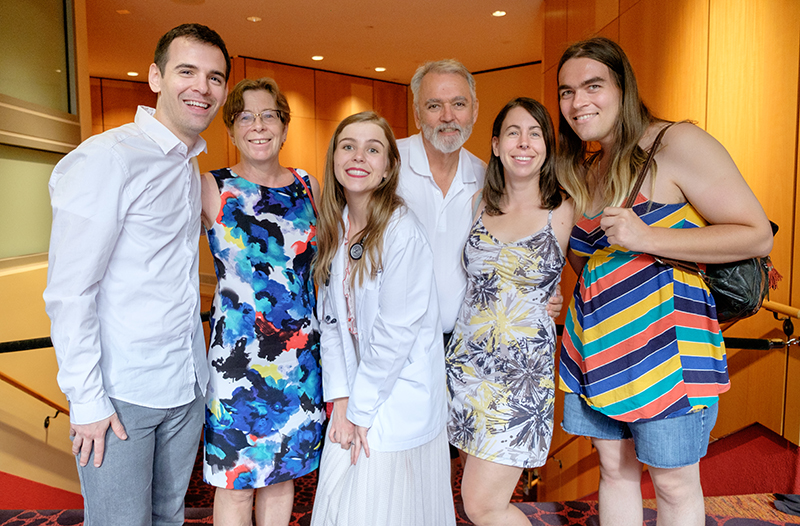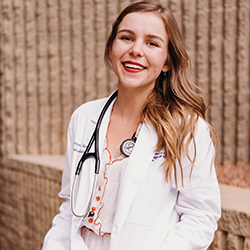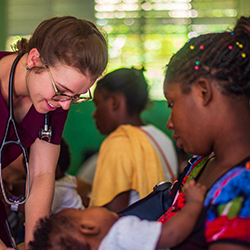
Primary Care Scholarship Profile: Merrion Dawson

To address the alarming physician shortage in Arizona, the University of Arizona College of Medicine – Phoenix has accepted eight medical students to receive tuition reimbursement in exchange for a commitment to practice in a rural or urban underserved community in Arizona. The University of Arizona Primary Care Physician Program, developed in partnership with and funded by a portion of $8 million provided by the State of Arizona, is part of the University's commitment to increase primary care providers in underserved communities statewide, and decrease medical student debt. The program was announced in November 2019. Once the program is fully implemented, about 100 students from the Colleges of Medicine (Phoenix and Tucson) could receive the reimbursement.
The UA College of Medicine – Phoenix is profiling several of the students who have committed their careers to primary care.
Meet Merrion Dawson
Second-year medical student Merrion Dawson has always been interested in medicine. As a child, her mother had to hide Band-Aids from her because she would constantly stick them on herself, pretending to be a doctor. In high school, she took courses like sports medicine and anatomy, which fueled her interest in medicine, as well. However, it wasn’t until college that she made the decision to pursue medicine.

Dawson has spent most of her life in Gilbert. She graduated from Highland High School and earned an undergraduate degree at the University of Arizona in public health with an emphasis in environmental and occupational health and a minor in biochemistry. After college, she wanted to work in public health before applying to medical school, so she worked as a mentor for Gila River Indian Community children with behavioral problems in a program called 4 Directions.
“This was probably the hardest job I have ever had, but it taught me a lot about social determinants of health, cultural humility and how to meet people where they are to help them improve their health,” she said.
After working there for a year, she became a research assistant at Synexus and worked with patients participating in clinical trials. “This job gave me the opportunity to work with family medicine doctors and sparked my interest in family medicine,” she said.”
Why Did You Commit to Primary Care?

How Would You Explain to Someone Who Doesn't Know Anything About the Primary Care Shortage, Why Primary Care Physicians (PCPs) are Needed?
Primary care physicians are needed because they can solve patients’ problems 90 percent of the time. Common things are common, and primary care physicians have the tools to help patients solve these issues. Additionally, they have the skill set to humanize the health care experience for patients. Primary care physicians are the people who want to take care of patients over their entire career; they want to create long-term relationships because that is what brings them joy.
Why Did You Choose the College of Medicine – Phoenix?
I knew from the moment after my interview that the College of Medicine – Phoenix was my home. I can't explain it, but I knew that the students I met and the people who I interviewed with were a perfect fit for me. It's the culture here that makes it wonderful to be a student.
About the College
Founded in 2007, the University of Arizona College of Medicine – Phoenix inspires and trains exemplary physicians, scientists and leaders to advance its core missions in education, research, clinical care and service to communities across Arizona. The college’s strength lies in our collaborations and partnerships with clinical affiliates, community organizations and industry sponsors. With our primary affiliate, Banner Health, we are recognized as the premier academic medical center in Phoenix. As an anchor institution of the Phoenix Bioscience Core, the college is home to signature research programs in neurosciences, cardiopulmonary diseases, immunology, informatics and metabolism. These focus areas uniquely position us to drive biomedical research and bolster economic development in the region.
As an urban institution with strong roots in rural and tribal health, the college has graduated more than 1,000 physicians and matriculates 130 students each year. Greater than 60% of matriculating students are from Arizona and many continue training at our GME sponsored residency programs, ultimately pursuing local academic and community-based opportunities. While our traditional four-year program continues to thrive, we will launch our recently approved accelerated three-year medical student curriculum with exclusive focus on primary care. This program is designed to further enhance workforce retention needs across Arizona.
The college has embarked on our strategic plan for 2025 to 2030. Learn more.